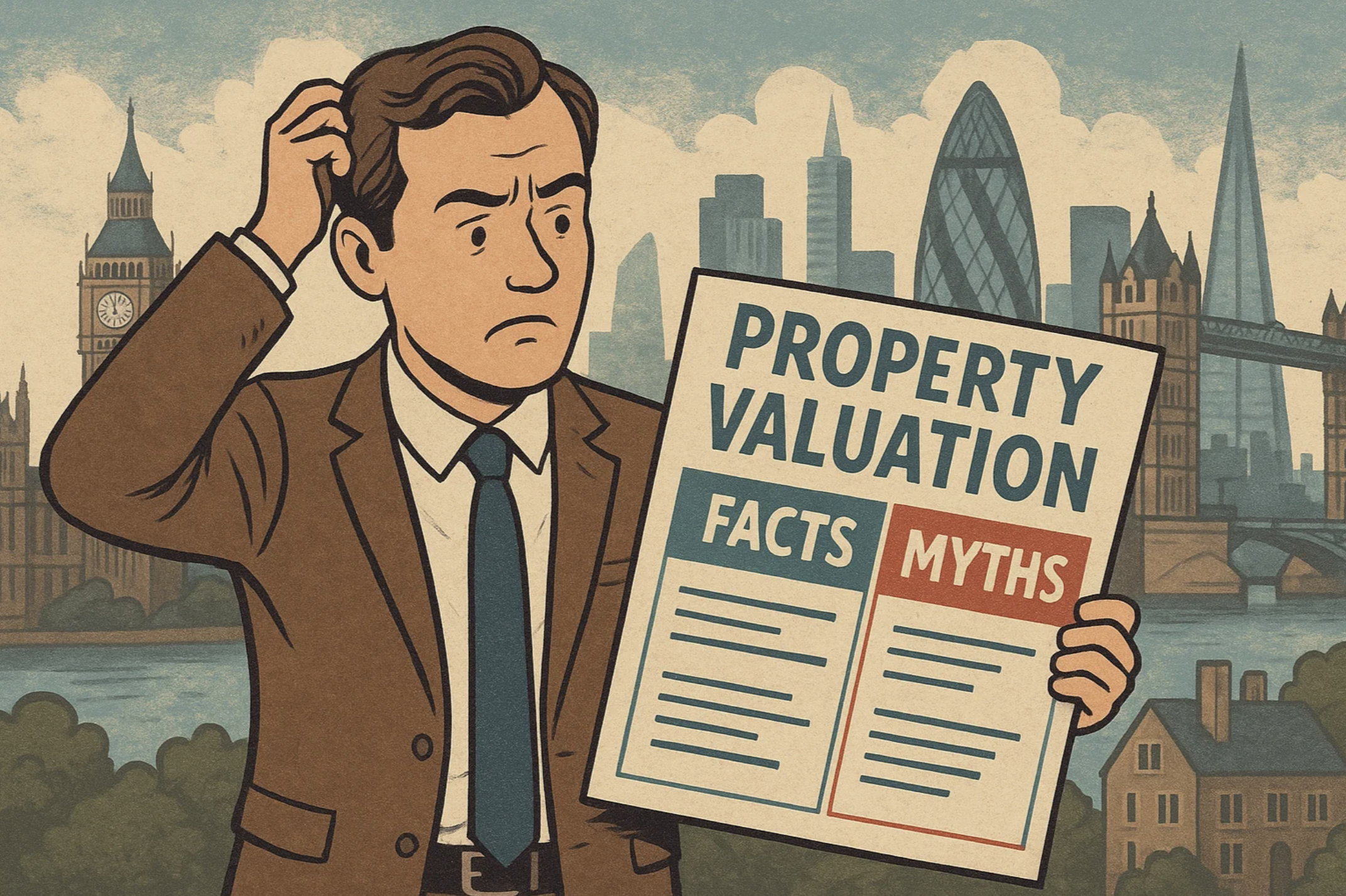Property valuation in London: facts, myths, and what you need to know
 TheHub@Druce
TheHub@Druce- •
- 17 Apr 2025

Property valuation in London: facts, myths, and what you need to know
Table of Contents
Property valuation in London: facts, myths, and what you need to know
Valuing your London home accurately is crucial for a successful sale, but the process is often clouded by myths and misconceptions. In a city where property prices vary dramatically—from £400,000 flats in Croydon to £2 million terraces in Islington—understanding the facts can help you set a realistic price and attract buyers. Here’s a guide to property valuation in London in 2025, debunking common myths and highlighting key truths.
Fact: valuations are based on comparable sales
A professional valuation relies on recent sales of similar properties in your area, adjusted for factors like size, condition, and location. In London, estate agents use data from the Land Registry, Rightmove, and Zoopla to compare your home to others within a 0.5-mile radius. For example, a two-bedroom flat in Shoreditch will be benchmarked against similar flats sold in the last 6-12 months. Always ask agents to provide evidence of these “comps” to justify their valuation.
Myth: The highest valuation is the best
Many sellers are tempted to choose the estate agent offering the highest valuation, but this can backfire. Overpricing deters buyers, especially in London’s price-sensitive market, where mortgage rates around 7% limit affordability. A property priced 10% above market value may sit unsold for months, forcing price cuts that signal desperation. Instead, select an agent with a realistic valuation backed by data, aiming for a price within 5% of fair market value.
Fact: Location and features drive value
In London, proximity to Tube stations, good schools, and amenities like parks can significantly boost your property’s value. For instance, homes within 500 meters of a Zone 1 station often command a premium. Upgrades like double glazing, modern kitchens, or an en-suite bathroom can add £10,000-£23,000, depending on the property type. However, avoid over-investing in renovations, as you may not recoup the full cost.
Myth: Estate agents set the sale price
Contrary to popular belief, estate agents don’t dictate your home’s final sale price—the market does. Agents provide a recommended asking price based on their expertise, but the actual price is determined by buyer demand and offers. In a competitive area like Wandsworth, a well-priced home may sell above asking if multiple buyers bid. Listen to market feedback: if viewings are scarce, your price may be too high.
Fact: Online valuation tools are a starting point
Tools like Zoopla’s “Zestimate” or Rightmove’s sold price data offer a rough guide to your property’s value, but they lack the nuance of an in-person appraisal. These tools don’t account for your home’s condition, recent upgrades, or micro-market trends (e.g., demand for family homes in Dulwich). Use them to get a ballpark figure, but always follow up with 2-3 estate agent valuations for accuracy.
Myth: A fresh coat of paint guarantees a higher valuation
While neutral decor can make your home more appealing, it doesn’t automatically increase its valuation. Painting over bold colours (e.g., lime green walls) creates a blank canvas, helping buyers visualise their life in the space, but the valuation is primarily driven by square footage, location, and market conditions. Focus on cost-effective fixes like decluttering and minor repairs to enhance appeal without overspending.
Fact: Lease length impacts valuation
For leasehold properties, a lease below 80 years can significantly reduce value and deter buyers, as extension costs escalate, and mortgage lenders hesitate. In London, where flats dominate, a lease above 90 years is ideal. If your lease is near 80 years, consider extending it before selling to boost your valuation—though this can cost £1,000s, it often adds more value than the outlay.
Myth: kitchens and bathrooms must be brand new
TV shows often suggest that a new kitchen or bathroom is essential for a high valuation, but this isn’t always true. While dated or poorly maintained kitchens can lower offers, buyers in London often prefer to customise these spaces themselves. A clean, functional kitchen with modern appliances is usually sufficient. Focus on minor upgrades like regrouting or replacing cabinet handles to refresh the space affordably.
What You Need to Know
- Get multiple valuations: Invite 2-3 estate agents to assess your home. Compare their figures and ask for supporting data to avoid inflated estimates.
- Consider timing: Spring and autumn are peak selling seasons in London, often yielding higher valuations due to increased demand.
- Factor in EPC Ratings: An Energy Performance Certificate (EPC) rating of C or above can enhance your valuation, as buyers prioritise energy efficiency. Check your EPC and consider low-cost upgrades like insulation if needed.
- Be realistic: In 2025, London’s market is cautious due to high interest rates. A valuation that reflects current buyer budgets (not your ideal price) will attract more interest and lead to a faster sale.
Valuing your London home accurately in 2025 is the foundation of a successful sale. By understanding market-driven valuations and debunking myths, you’ll set a price that attracts buyers and maximises your return.
For expert support, please contact @Druce at +44 020 7043 1717, email [email protected], or visit www.druce.com.
Or you can pop in at your preferred branches
The #1 tip for a quick sale
London’s property market offers international buyers a wide range of opportunities, whether you're seeking a long-term investment, a high rental yield, a family home, or a second residence. With its stable market, high rental demand, world-class education system, business opportunities, and unmatched lifestyle.
